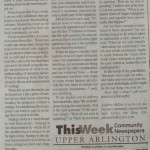ThisWeek UA 10/28/2009
I love woodworking, building furniture and carving what I might generously call pieces of “art”. Good lumber can be expensive so I’m often reminded of an old saying my carpenter grandfather taught me: “Measure twice and cut once.” Pop knew a lot about making the most of your resources available having worked his way through the great depression. As a carpenter he knew how to make a strong bond between different types of materials; and I know he knew a little something about building those bonds between people too.
When I remember Pop’s words I can say with confidence they applied to much more than building cabinets; measuring twice to cut once can be applied to how we build community as well.
Fiscal responsibility is a common term these days. Those two words can mean many things but tend to be a sort of code; suggesting an intent to make cuts to budgets, to staff and to resources. Behind this code is the fact that these cuts are to be made using the single measurement of what is expedient today, of monetary tactics. What is missing from that approach is the second measurement of strategy.
When this occurs the results can be disastrous. Like a piece of lumber cut too short to use removing funding for programs without a strategy for maintaining those programs can leave a gap in coverage that is unrecoverable.
Strategy looks at a much broader view than tactics. Strategy is the measurement by which all of the variables have a chance to see the light of day. Strategy is the second measurement that keeps us from cutting too short and creating gaps.
As participants in a representative democracy we expect those leaders who we have voted for to follow a similar mental compass as our own. Agreements on these general principles are what win our vote more often than a stance taken on a single issue. Unfortunately, once elected, we as voters often get caught up in the single issues as a point of tactics instead of looking at a larger strategy.
Much worse is when our elected officials join us in single-mindedness; trapped in tactics instead of embracing the larger strategy. At this point vision is lost.
Of course there are fiscal realities that we face. We are looking at budget shortfalls within nearly every organization these days, both public and private.
Relying on what is monetarily prudent for the moment is expedient and can be effective for today. But when you’re looking to sustain your community and if possible leave it a little better than you found it, monetary concerns are only a small part of the equation.
Albert Einstein once said, “If I had an hour to solve a problem and my life depended on it I would use the first 55 minutes to formulate the right question, because as soon as I have identified the right question I can solve the problem in less than five minutes.”
When we stop to consider the hard realities that exist in Upper Arlington today; our population is aging and shrinking, our amenities are being out-paced by other communities and our volunteer base – those community members who make so many events happen and provide the free labor to sustain our community institutions – well, it is shrinking.
If our leaders are to address these shortfalls, these “life or death” issues facing our community, what is the right question? Is the question simply “How do we reign in spending?” or “How do we lower taxes?” Those simple questions have the potential for equally simplistic answers. However, questions like that have a lot of momentum in these times because they satisfy the human desire to see things in a straightforward, black and white way.
I believe these issues go beyond “fiscal responsibility”; instead they become a question of “communal responsibility”. What happens when we get serious about the questions, when we dig deeper than just monetary goals?
Instead of asking the simplistic question “How do we reign in spending” I believe now is the time to ask the question, “What is our shared vision of Upper Arlington’s future and together how can we make that happen?”
Are we brave enough to truly listen to those answers? Are we strong enough to do what it takes to implement a new, shared vision? What do we individually value about our community? Are we, as a whole community, ready to unite behind the values that made Upper Arlington so great in the past: tradition, leadership and participation?
In the words of my grandfather, “Measure twice and cut once…and make sure you keep your fingers clear of the blade or this might be the last thing you ever cut.”
Now that’s what I call some practical philosophy.
